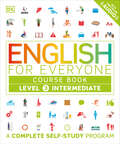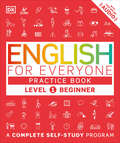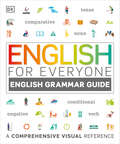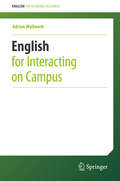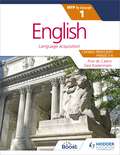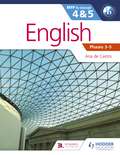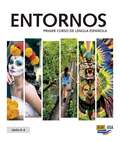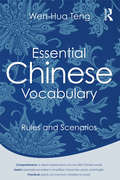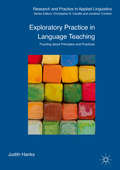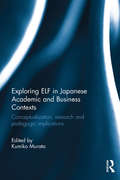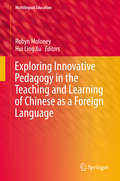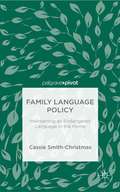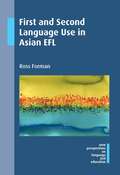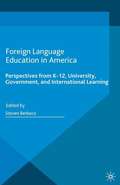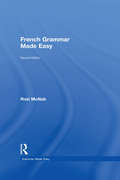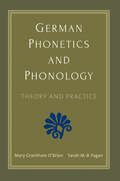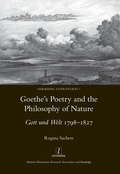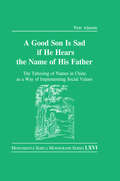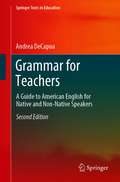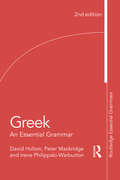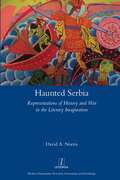- Table View
- List View
English for Everyone: A Complete Self-Study Program (DK English for Everyone)
by DKPLEASE NOTE - this is a replica of the print book and you will need paper and a pencil to complete the exercises.Take your self-study English language learning a step further with the third book in the easy-to-use, visual learning series.English for Everyone Level 3 Intermediate Course Book introduces topics such as telling a story, describing new experiences, relationships, and problem-solving. The step-by-step teaching methods are clear and engaging, making the English language easy to learn by yourself. Key language skills, grammar rules, and vocabulary are explained alongside colorful illustrations to help you put new language into context. Listening, speaking, reading, and writing exercises are set in bite-sized modules, allowing you to learn at your own pace.Free audio is available online to support your language learning, featuring native English speakers. The audio examples help you to build experience of spoken English and give you the chance to perfect your pronunciation.English for Everyone is aligned to the CEFR, the international standard for language learning, and ideal for preparation for major English-language exams including IELTS, TOEIC, and TOEFL. Whether you want to improve your English for work, study, or travel, the Level 3 Intermediate Course Book will make it incredibly easy to teach yourself English.
English for Everyone: A Complete Self-Study Program (DK English for Everyone)
by DKPLEASE NOTE - this is a replica of the print book and you will need paper and a pencil to complete the exercises.Practice makes perfect with this exciting guide to learning English.Work your way up with the ultimate self-study course that is easy to use and quick to learn. This practice book has a huge variety of bite-sized, attractively presented exercises to drill the language skills taught in English for Everyone Level 1 Beginner Practice Book. Hundreds of activities and accompanying audio cover listening, speaking, reading, and writing to reinforce language skills.You&’ll expand your English vocabulary with topics like introducing yourself, your job, and hobbies and interests. Get to grips with grammar rules, including using apostrophes and joining sentences, and perfect your pronunciation with audio exercises by native speakers. Eye-catching illustrations and step-by-step explanations keep content simple and straightforward for easy learning.Level 1 Beginner Practice Book is part of DK's best-selling English for Everyone series. It is suitable for all levels of English language learners and provides the perfect reading companion for study, exams, work, or travel. With audio material available on the accompanying website and Android/iOS app, there has never been a better time to learn English.
English for Everyone: A Comprehensive Visual Reference (DK English for Everyone)
by DKPuzzled by past tenses? Confused be comparatives? The English for Everyone Grammar Guide is packed with easy-to-follow English grammar rules and annotated sample sentences. Ideal for English test preparations or ESL lesson plans, the Grammar Guide uses visual teaching methods to introduce English grammar for beginners, reinforced through a variety of exercises and examples when used alongside our Grammar Practice Book. Once you have built up your confidence in the written English language, the Grammar Guide can act as a reference point for more advanced sentence structures in practical English usage.About English For EveryoneEnglish for Everyone is a series of guides and practice books that support English learning for teenagers and adults from a beginner level, to intermediate, and advanced practical English. Offering an easy-to-follow format that offers guidance for both teaching English as a foreign language, and a self-study approach with resources available to improve English speaking, reading, and writing.Whether you are looking for ESL teaching resources, or a structured program for adults to learn English as a second language, the English for Everyone Series provides:- Sample language examples: New language topics are introduced in context using clear, illustrated, and color-coded explanations- Supporting audio: Extensive English-speaking audio materials integrated into every unit, giving vital oral and listening practice. (All supplementary audio is available on the DK English for Everyone website and IOS/Android App).- Quick referencing: Easy-to-follow units, mirrored in both the Course and Practice Books for easy referencing and teaching- Sentence formation guides: Visual break downs of essential English grammar in use, showing learners how to recreate even complex English sentences- Visual English vocabulary cues: Lists of useful English words and common phrases with visual aids are available throughout the book- Personalised learning: Write-on lines encourage ESL learners to write their prompts and translations The English for Everyone Series covers the skills and topics required for all major global English-language exams and reference frameworks including:- CEFR- TOEFL - IELTS - TOEIC
English for Interacting on Campus
by Adrian WallworkThis volume covers the day-to-day activities of a non-native English speaking student carrying out research, attending lectures, socializing, and living in a foreign country. Whether on a US campus as a foreign student, or in a non-English speaking country where classes are given in English, this book will help students build confidence in interacting with professors and fellow students.
English for the IB MYP 1
by Zara Kaiserimam Ana de Castro Stephanie BarrusExam Board: MYPLevel: IBSubject: EnglishFirst Teaching: September 2016First Exam: June 2017Develop your skills to become an inquiring learner; ensure you navigate the MYP framework with confidence using a concept-driven and assessment-focused approach to English presented in global contexts.- Develop conceptual understanding with key MYP concepts and related concepts at the heart of each chapter.- Learn by asking questions with a statement of inquiry in each chapter. - Prepare for every aspect of assessment using support and tasks designed by experienced educators.- Understand how to extend your learning through research projects and interdisciplinary opportunities.
English for the IB MYP 1
by Zara Kaiserimam Ana de CastroExam Board: MYPLevel: IBSubject: EnglishFirst Teaching: September 2016First Exam: June 2017Develop your skills to become an inquiring learner; ensure you navigate the MYP framework with confidence using a concept-driven and assessment-focused approach to English presented in global contexts.- Develop conceptual understanding with key MYP concepts and related concepts at the heart of each chapter.- Learn by asking questions with a statement of inquiry in each chapter. - Prepare for every aspect of assessment using support and tasks designed by experienced educators.- Understand how to extend your learning through research projects and interdisciplinary opportunities.
English for the IB MYP 4 & 5: MYP by Concept (MYP By Concept)
by Ana de CastroWe are working with the IBO to gain endorsement for the MYP by Concept series.Drive meaningful inquiry for the new framework through a unique concept driven narrative.- Supports every aspect of assessment with opportunities that use the criteria- Gives you easy ways to differentiate and extend learning- Provides a meaningful approach by integrating the inquiry statement in a global context- Develops critical-thinking skills with activities and summative sections rooted in the ATL frameworkAlso coming soon are Teaching and Learning Resources and eTextbooks via Dynamic Learning, our complete digital solution.
English for the IB MYP 4 & 5: MYP by Concept (MYP By Concept)
by Ana de CastroWe are working with the IBO to gain endorsement for the MYP by Concept series.Drive meaningful inquiry for the new framework through a unique concept driven narrative.- Supports every aspect of assessment with opportunities that use the criteria- Gives you easy ways to differentiate and extend learning- Provides a meaningful approach by integrating the inquiry statement in a global context- Develops critical-thinking skills with activities and summative sections rooted in the ATL frameworkAlso coming soon are Teaching and Learning Resources and eTextbooks via Dynamic Learning, our complete digital solution.
Entornos Units 0-4
by Celia MeanaEntornos, an introductory Spanish course, helps you develop the language you need to connect to real-world, practical issues. Entornos supports communicative, empowered learning. Inductive learning helps students deepen their understanding of language through discovery and inference. Real-life learning gives immersive, relatable scenarios, and provides a framework for communication. Learning strategies reinforce learning as students understand the processes and methods that work best for them. Social and emotional relevance increases students' motivation to learn a language, boosting acquisition and retention. Cultural and intercultural learning builds global awareness while developing authentic communication skills.
Essential Chinese Vocabulary: Rules and Scenarios
by Wen-Hua TengEssential Chinese Vocabulary: Rules and Scenarios is an indispensable guide for beginner to intermediate students of Chinese who wish to use essential Chinese words and phrases accurately. The book provides the crucial context and explanations of grammar structures and language rules related to important Chinese words and phrases, too often glossed over in primary textbooks. Students are given the tools necessary to refine their use of these words and phrases in order to communicate effectively in Chinese. Key features: In-depth explanations of commonly used words and phrases contextualized with a range of authentic examples providing learners with a comprehensive understanding of the vocabulary-use and allowing them to express themselves more accurately and appropriately. Bridges the gap between grammar and vocabulary by presenting the frequently-ignored rules that govern the use of words and phrases. Clear and systematic comparisons between the uses of ostensibly similar words, highlighting the nuances of the Chinese language. Examples provided in Chinese characters, pinyin and English. Extensive cross-references. Essential Chinese Vocabulary is a unique reference and useful complement to basic and intermediate Chinese language textbooks.
Exploratory Practice in Language Teaching
by Judith HanksThis book tracks the development of Exploratory Practice since the early 1990s as an original form of practitioner research in the field of English language teaching. Drawing on case studies, vignettes and narratives from teachers and learners around the world as they experienced Exploratory Practice in their different contexts, Hanks examines the theoretical and philosophical underpinnings of the Exploratory Practice framework and asks what the principles really mean in practice. For language professionals considering investigating their classrooms and their teaching/learning practices rigorously and thoughtfully, this book breaks new ground, arguing for a fresh perspective: (exploratory) practice-as-research. Judith Hanks is Lecturer in TESOL at the University of Leeds, UK. Her work bridges specialist areas in language teacher education, intercultural communication, TESOL and EAP.
Exploring ELF in Japanese Academic and Business Contexts: Conceptualisation, research and pedagogic implications
by Kumiko MurataThis book investigates the theoretical, empirical and pedagogical issues to help us better understand what is happening with English as a Lingua Franca (ELF) communication and to activate this knowledge in respective communicative contexts. It focuses specifically on Japanese contexts and also includes theoretical and practical sections pertinent to all ELF researchers, practitioners and students, irrespective of their national or regional differences. It further attempts to connect this new field of research to established fields of linguistics and applied linguistics such as communication, assessment and multilingualism by exploring them from an ELF perspective, which is challenging but essential for the development of the field. Exploring ELF in Japanese Academic and Business Contexts: Conceptualisation, research and pedagogic implications includes chapters about: English in a Global Context Own-language use in academic discourse English as a lingua franca in international business contexts A linguistic soundscape/landscape analysis of ELF information provision in public transport in Tokyo Using pragmatic strategies for effective ELF communication: Relevance to classroom practice This book will be of interest to scholars and post-graduate students working in the fields of Applied Linguistics/TESOL. It will also engage researchers studying the growing influence of English around the world.
Exploring Innovative Pedagogy in the Teaching and Learning of Chinese as a Foreign Language
by Robyn Moloney Hui Ling XuTeachers of Chinese as a foreign language in many international contexts are searching for pedagogic solutions to promote effective learning. Models of innovative and successful approaches are urgently needed. This volume presents a collection of compelling and empirically rich research studies that showcases innovative developments in the practice of teaching Chinese as a foreign language. The studies focus on three interrelated areas: learners, teachers, and applications of new technologies. Specifically, the studies explore methods for fostering learner-centred classrooms, autonomous learners, intercultural learning, the role of teacher views and identities, the nature of a 'middle ground' approach, and technologies that accommodate the unique aspects of the Chinese language, with new options for mobile and interactive learners. Providing both inspiration and practical models for language practitioners and researchers, it offers a vital resource for teachers' professional development, and for pre-service teacher education.
Final Draft 1
by Pamela Hartmann Robyn Brinks Lockwood David Bohlke Wendy AsplinAcademic writing is difficult, and Final Draft gives students all the tools they need. Writing skills and in-depth analysis of models set the stage for development. Corpus-based vocabulary, collocations, and phrases, as well as detailed information on the grammar of writing, prepare your learners for college writing courses. Students learn to avoid plagiarism in every chapter of every level. This dedicated, long-term focus on plagiarism avoidance helps ensure that these students are able to use sources and highlight their own thoughts.
First and Second Language Use in Asian EFL
by Ross FormanMany Asian education systems discourage or even ban the use of L1 in L2 classrooms - although in fact L1 remains widely used by teachers. Why is L1 use still devalued in this context? By observing classes and interviewing teachers, this book explores three dimensions of L1 use in L2 teaching: pedagogy: what teachers actually do, and what they say about it; the personal: what happens to identity when we 'perform' a foreign tongue; the professional: how textbooks are used, and what is distinctive about the EFL domain.
Foreign Language Education in America: Perspectives from K-12, University, Government, and International Learning
by Steven BerbecoForeign language teaching in America today falls into three distinct fields of influence and interest: public and private schools, college and other post-secondary programs, and courses for adult learners. At a time when academics and instructors in each of these fields seek to answer similar questions, too few published resources recognize and address the parallels among them.
French Grammar Made Easy (Grammar Made Easy)
by Rosi McnabFrench Grammar Made Easy is the ideal introduction to the basics of French grammar for anyone new to the language or looking to refresh their knowledge. The Grammar features: concise and jargon-free explanations supported by examples exercises throughout to reinforce learning a "fast-track" option for more advanced learners a full answer key, making the Grammar ideal for self-study. A new companion website is available at http://cw.routledge.com/textbooks/9780340900949/ With over 200 additional exercises and audio, it provides ample grammar practice for learners as well as the opportunity to practise listening and pronunciation skills. French Grammar Made Easy presents the essential patterns and rules of the French language in a clear and accessible manner. It is the ideal Grammar for those wishing to supplement their learning and move beyond the phrasebook level.
German Phonetics and Phonology: Theory and Practice
by Prof. Mary Grantham O'Brien Prof. Sarah M. FaganThe first course book designed to engage students in the pronunciation of modern German by grounding practice in theory An essential introduction to the pronunciation of modern German, this unique classroom text is designed to help mid- to upper-level undergraduate students of German produce more accurate and comprehensible German speech. Written in English in a clear and engaging style and employing a minimum of technical jargon, it is the first German phonetics and phonology text to focus on theory and practice, covering topics ranging from the analysis of one's own speech to historical developments and regional variation. This work includes a wealth of exercises supported by an ancillary website audio program designed to help students perceive and produce sounds and prosodic features more accurately. Addressing topics such as word stress, sentence stress, and intonation as well as the pronunciation of individual sounds, this one-of-a-kind primer provides its users with a solid basis in German phonetics and phonology in order to improve their pronunciation of German.
Glimpses of Oneida Life
by Norma Kennedy Karin Michelson Mercy A. DoxtatorGlimpses of Oneida Life is a remarkable compilation of modern stories of community life at the Oneida Nation of the Thames Settlement and the surrounding area. With topics ranging from work experiences and Oneida customs to pranks, humorous encounters, and ghost stories, these fifty-two unscripted narrations and conversations in Oneida represent a rare collection of first-hand Iroquoian reflections on aspects of daily life and culture not found in print elsewhere.Each text is presented in Oneida with both an interlinear, word-by-word translation and a more colloquial translation in English. The book also contains a grammatical sketch of the Oneida language by Karin Michelson, co-author of the Oneida-English/English-Oneida Dictionary, that describes how words are structured and combined into larger linguistic structures, thus allowing Glimpses to be used as a teaching text as well.The engrossing tales in Glimpses of Oneida Life will be a valuable resource for linguists and language learners, a useful source for those studying the history and culture of Iroquois people in the twentieth-century, and an entertaining read for anyone interested in everyday First Nations life in southern Ontario.
Goethe's Poetry and the Philosophy of Nature: Gott Und Welt 1798-1827
by Regina SachersAt the beginning of the nineteenth century, philosophy and theology come under increasing pressure owing to the emergence of the modern sciences. The collection Gott und Welt is Goethe's poetic contribution to this conflict, in which an alternative to orthodox Christianity was being sought. Following the collection's various stages of composition and publication, this study offers new readings of some of Goethe's best known poems: 'Die Metamorphose der Pflanzen', 'Dauer im Wechsel', 'Urworte. Orphisch' and 'Wiederfinden'. Sachers shows that Gott und Welt is the long poem on nature which Goethe attempted to write for the last third of his life. As such it represents Goethe's unique answers to the intellectual challenges posed by the dawning age of science. Regina Sachers is Lecturer in German at Exeter College, Oxford.
Good Son is Sad If He Hears the Name of His Father: The Tabooing of Names in China as a Way of Implementing Social Values (Monumenta Serica Monograph Ser.)
by Piotr AdamekWhen in 1775 the scholar Wang Xihou compiled a dictionary called Ziguan , he wrote, for illustrative purposes, the personal names of Confucius and the three emperors Kangxi, Yongzheng and Qianlong in the introduction. In oversight, he recorded their complete names. This accidental writing of a few names was condemned by Emperor Qianlong as an unprecedented crime, rebellion and high treason. Wang Xihou was executed, his property confiscated and his books were burnt. His family was arrested and his sons and grandsons were killed or sent as slaves to Heilongjiang. It is surprising what an enormous impact the tabooing of names (bihui ) had on Chinese culture. The names of sovereigns, ancestors, officials, teachers, and even friends were all considered taboo, in other words it was prohibited to pronounce them or to record them in writing. In numerous cases characters identical or similar in writing or pronunciation were often avoided as well. The tabooing of names was observed in the family and on the street, in the office and in the emperor's palace. The practice of bihui had serious consequences for the daily lives of the Chinese and for Chinese historiography. People even avoided certain places and things, and refused to accept offices. They were punished and sometimes even killed in connection with the tabooing of names. The bihui custom existed as an important element of Chinese culture and was perceived as significant by Chinese and foreigners alike. It was crucial for implementing social values and demonstrating the political hierarchy. The present work A Good Son Is Sad if He Hears the Name of His Father is a systematic study of Chinese name-tabooing customs, which until now have been relatively little explored in Western-language Sinological studies. It attempts to provide a long-term perspective on the changing dynamics of tabooing and elucidates various aspects related to the fascinating topic of tabooing of names.
Grammar for Teachers
by Andrea DecapuaUpdated and revised with more examples and expanded discussions, this second edition continues the aim of providing teachers with a solid understanding of the use and function of grammatical structures in American English. The book avoids jargon and presents essential grammatical structures clearly and concisely. Dr. DeCapua approaches grammar from a descriptive rather than a prescriptive standpoint, discussing differences between formal and informal language, and spoken and written English. The text draws examples from a wide variety of authentic materials to illustrate grammatical concepts. The many activities throughout the book engage users in exploring the different elements of grammar and in considering how these elements work together to form meaning. Users are encouraged to tap into their own, often subconscious, knowledge of grammar to consciously apply their knowledge to their own varied teaching settings. The text also emphasizes the importance of understanding grammar from the perspective of English language learners, an approach that allows teachers to better appreciate the difficulties these learners face. Specific areas of difficulties for learners of English are highlighted throughout.
Greek: An Essential Grammar of the Modern Language (Current Issues In Linguistic Theory Ser. #117)
by David Holton Peter Mackridge Irene Philippaki-WarburtonGreek: An Essential Grammar is a concise and user-friendly reference guide to modern Greek. It presents a fresh and accessible description of the language in short, readable sections. Explanations are clear and supported by examples throughout. This new edition has been revised and updated to present an accurate and accessible description of the most important aspects of modern Greek. Features include: clear and up-to-date examples special attention to those points which often cause problems to English-speaking learners Greek/English comparisons and contrasts highlighted throughout. Greek: An Essential Grammar is ideal for learners involved in independent study and for students in schools, colleges, universities and adult classes of all types. Levels CEFR scale A1-B2 and ACTFL level Low-Intermediate to Advanced.
Haunted Serbia: Representations of History and War in the Literary Imagination (Legenda)
by David NorrisHaunting is what happens when the past is disturbed and the victims of previous violence, who are thought to be buried and forgotten, are brought back to the present and made to live again. Serbian fiction writers of the 1980s exhume the ghosts of the past, re-remembering the cruelty of the twentieth century, reinterpreting the heroic role of the Partisans and the extraordinary measures taken to defend Yugoslavia’s recently won independence and socialist revolution. Their uncanny and ghostly imagery challenges the assumptions of the master discourse promoted by the country’s orthodox communist authorities and questions the historical roots of social and cultural identities. The instability of this period of transition is deepened during the wars of the 1990s, when authors turn from the memory of past violence to face the ferocious brutality of new conflicts. The haunting evocations in their work continue to articulate fresh uncertainties as the trappings of modern civilization are stripped away and replaced by the destructive logic of civil war. The past returns once more with renewed energy in the struggle to make sense of a vastly changed world.
